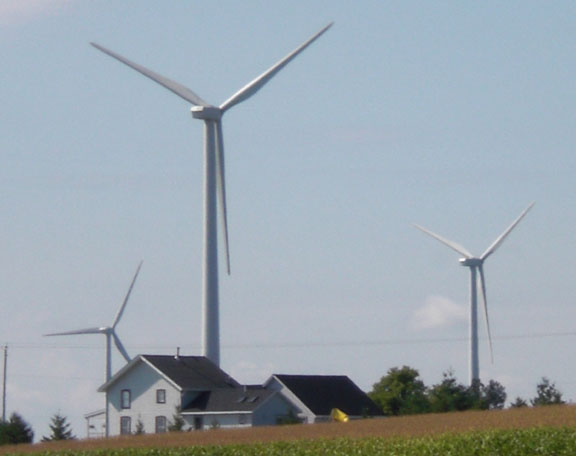 HOME IN A WISCONSIN WIND FARM: What the setbacks from homes look like in the Invenergy Forward Energy Wind Farm near the Town of Byron, Fond du Lac County
HOME IN A WISCONSIN WIND FARM: What the setbacks from homes look like in the Invenergy Forward Energy Wind Farm near the Town of Byron, Fond du Lac County
FROM THE DOCKET: If you'd like to review the testimony and public comments for the proposed Glacier Hills project CLICK HERE and enter docket number 6630-CE-302.
To see maps and find out more about this project, CLICK HERE.
The following is included as part of the documents submitted regarding the Glacier Hills project. It was written by James Vollmer, who is a resident of the Blue Sky/Green Field project which is owned by WE Energies. WE Energies will also own the Glacier Hills farm.
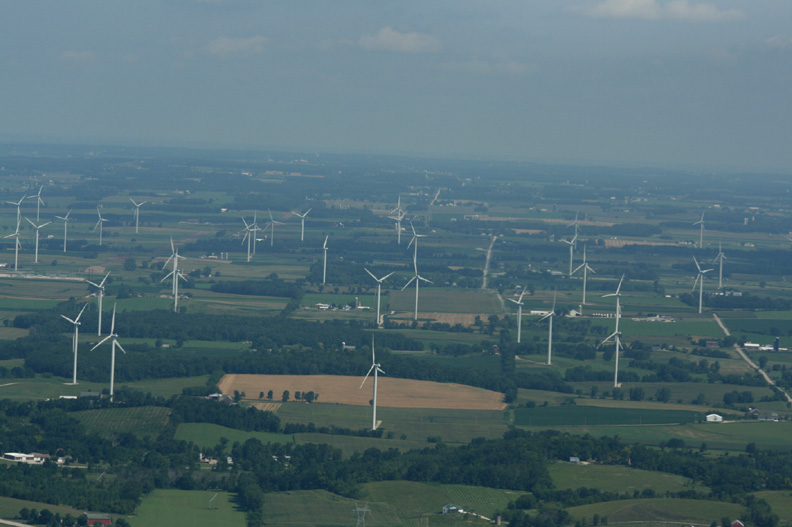 Blue Sky/ Green Field wind farm, Towns of Malone and Marshfield, Fond du Lac County. Photo by Gerry Meyer
Blue Sky/ Green Field wind farm, Towns of Malone and Marshfield, Fond du Lac County. Photo by Gerry Meyer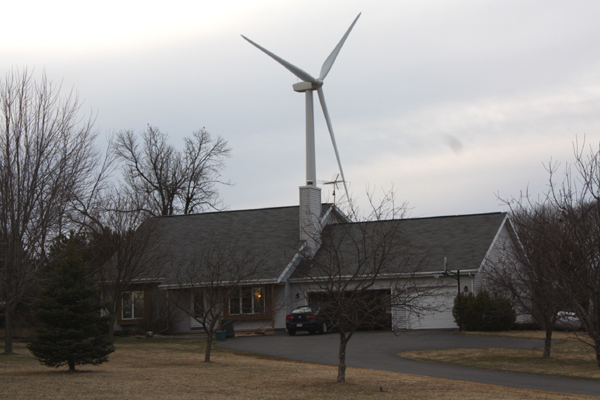 Home in a wind farm with a 1000 foot setback: Fond du Lac County Wisconsin
Home in a wind farm with a 1000 foot setback: Fond du Lac County Wisconsin
"Since the wind turbines have been turning I have had to deal with several different problems and have not had any of my complaints resolved.
I have had problems with TV reception, radio reception, cell phone phone reception, shadow flicker, poultry dying, noise keeping me awake at night and have been forced into selling my property to get away from these problems.
I'm not even able to get anyone to even make an offer on the house since it has been for sale.
When [WE Energies] started the project we were told that any TV problems would be taken care of.
Since then they have made me jump through all kinds of hoops in order to get the dish that was in stalled on the house. The dish still does not work properly. When watching the TV the screen still locks up and the voices are off from the lip movement and the only thing they tell me is that I have to wait for the technology to get better.
It is coming up on two years and the problems are still not fixed.
Now they are going around and having people sign a contract that will only give them the local channels which consist of four stations. And should we be happy with this?
I will take time and send in more info on this subject as I have time.
(Written by James Vollmer to the Public Service Commission of Wisconsin)
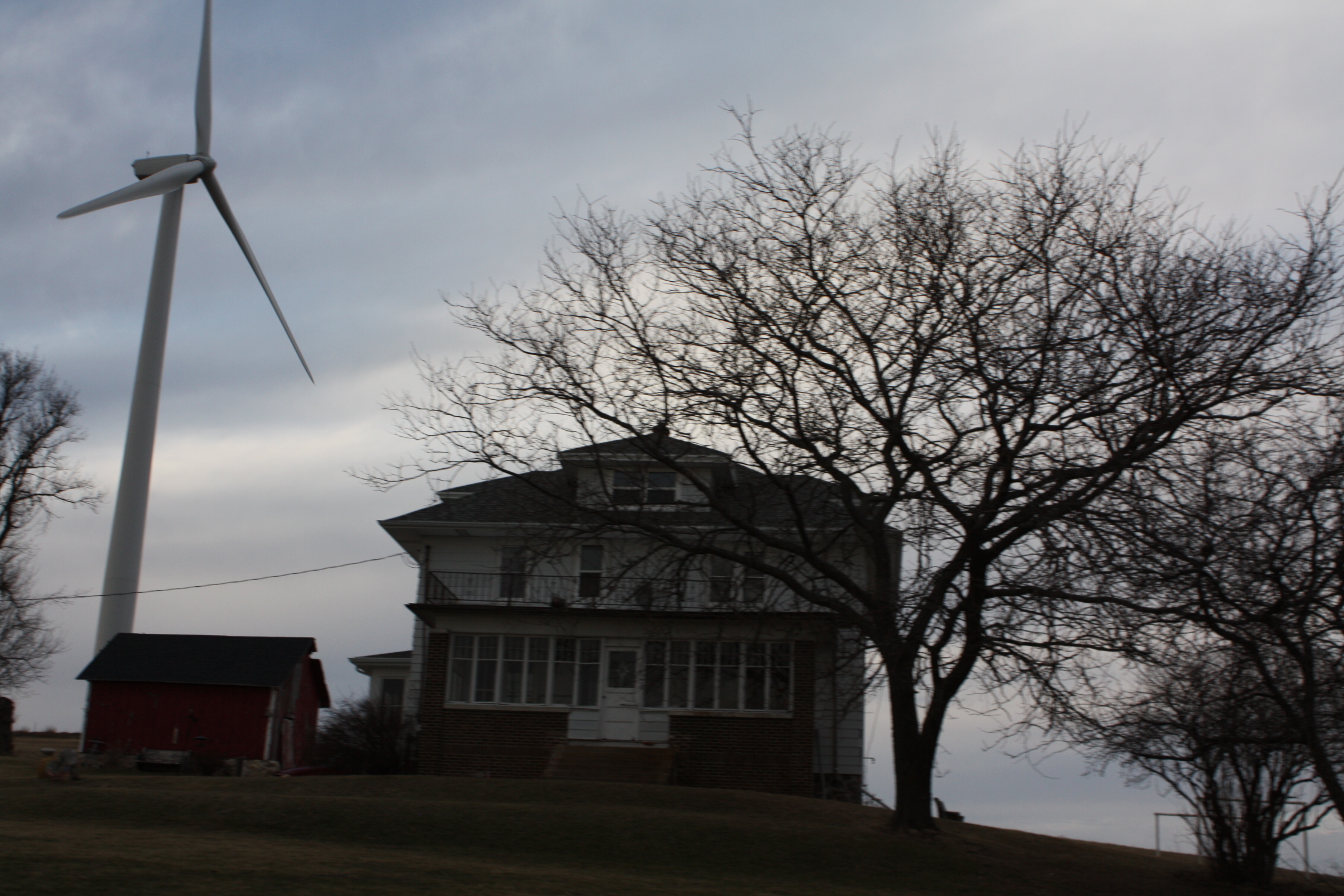
Mr. Vollmer was one of the residents interviewed for a book proposal about life in a Wisconsin Wind farm. The interview took place in late June of this year.
This is an early draft of the chapter about his experiences:
James Vollmer’s home is located inside one of Wisconsin’s more recent wind farms near the town of Malone, in Fond du Lac County. The 88- turbine project known as Blue Sky/Green Field, has been operational for about a year and a half.
The yellow farm house is an old-fashioned four-square and the vintage barn is attractive, solid and has a brand new roof.
There is a superb mechanic’s workshop large enough to contain a few vintage cars, tractors, huge pieces of farm equipment, work benches and heavy duty tools. It has a fine concrete floor.
James is a mechanic and he did most of the work on the shop himself, putting everything he had into getting it just the way he wanted it. He intended to be there awhile.
There is also a nice sized chicken house and from it comes the pleasant sound of roosters crowing and chickens clucking. James also raises poultry. He’s been breeding and showing prize-winning birds for most of his life.
It’s a tidy little farm with a nice feel to it, so the “For Sale” sign in front of this home comes as a surprise.
James lets me know the for sale sign isn’t something he ever wanted to see there, but the reason for it is clear. Scores of wind turbines surround his home—each as tall as a 40-story building. And the multitude of problems that come with them have made life unbearable. The subject of selling his place clearly pained him. We spoke just a few hours before the realtor held the first open house.
The noise from the turbines is much louder and more bothersome than he was told it would be. The shadow flicker is much more severe than he was told it would be.The turbine problems also include loss of radio, TV and cell phone reception. But the most troubling problem of all has to do with his chickens.
James has been around chickens his whole life. His grandmother and grandfather raised poultry and he says he took to it right away. “I can’t remember a time in my life when I wasn’t around chickens.” He shows me a photograph taken by his grandmother of Jim as a toddler. He’s lying on his stomach with a half a dozen baby chicks nestled together on his back looking as content as if they were in a nest.
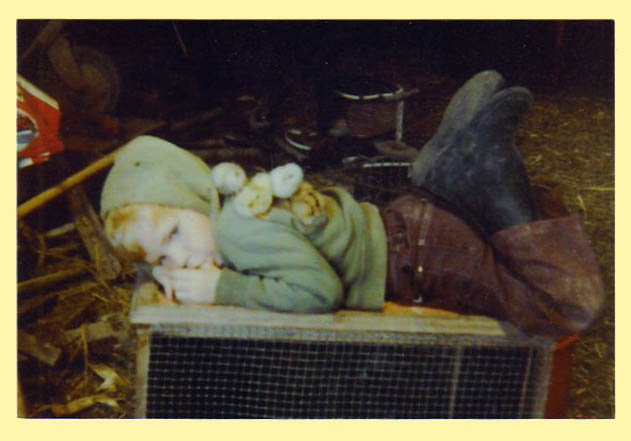
James Vollmer as a toddler with his baby chicks. Photo taken by his grandmother.
Says James, “I’ve always liked them.”
He joined 4-H and by the age of nine he was showing chickens at the county fair. He handed me one of his earliest 4-H notebooks. Even at an early age he was a meticulous record keeper, a habit he has never lost. He’s been documenting all that has happened since the wind turbines started up.
When asked about his chickens, a pained look crosses his face. How could someone who has raised healthy prize-winning poultry his whole life find himself in a situation where he is unable to keep them alive?
We go into the chicken house together. A sick bird huddles against a wire fence. A few birds move about but seem lethargic. “They shouldn’t be hanging their heads and sitting there like that,” says James, “They should be going outside and running around.”
He tells me he knew there was trouble when his birds went into a full molt the first winter the turbines were on line. “Then they pretty much quit laying eggs.” He lets me know that a full molt in winter is unusual, birds don’t molt in the winter when they need their feathers most to stay warm. And he’d never had a problem with egg production before. “I didn’t know what was going on.”
The shadow flicker from the turbines was so severe it woke him up in the morning. Like others I spoke to in the Blue Sky/Green Field project, James said the effect is unbearable. Enormous shadows passing rapidly across his entire home, barn, workshop and chicken house are relentless and inescapable. James, along with many others I spoke with, talked about getting headaches caused by the severe shadows and light flashing on and off inside and outside his house.
When he called WE Energies to complain, he was sent a form on which he was to record the time, location and duration of the shadow flicker. He did just that and sent it in.
A representative then contacted James and told him that as far as WE Energies was concerned, the shadow flicker he was experiencing was a non-issue and WE Energies had no plans to remedy the problem.
James sent along a copy of a video he’d made of the shadow flicker in his home. A representative later contacted him and offered to provide window blinds for the windows that were in the video, but would not agree to provide blinds for any of the other windows because James had not recorded them. He made yet another video, and after six months and many phone calls, WE Energies finally installed blinds on his home.
Now he has to have the blinds completely down and his lights on in the morning. He didn’t like having a dark house or having to use electricity to keep lights on during the day, but he can’t stand the shadow flicker so he had no choice.
His birds, however, were having a harder time. He tells me chickens have an instinctive fear and stress response to rapidly passing shadows. It signals the approach of predators like hawks and owls. Chickens are also very sensitive to changes in light and darkness.
James noticed the chickens didn’t seem to want to go out doors anymore after the turbines were running. Instead of behaving as they always had and getting the benefits of sunshine, fresh greens and insects, they stayed huddled in the chicken house. Their health began to suffer.
After a lifetime of successfully raising poultry, James Vollmer’s chickens were no longer thriving. Even the young birds were starting to die. When I visited with him he said he’d lost eight more in the last two weeks. “From twenty white hens, I’m down to eight or nine now.”
The chickens don’t seem to be the only birds that have been affected since the turbines went on line. James mentions the disappearance of the flocks of barn swallows that had been a fixture on the farm for years. “There used to be so many. We had twenty to thirty nests every year. when I’d cut the grass they’d just be swooping all over the place. Now they’re gone,” he says, And the hummingbirds are gone too.”
He tried everything he could think of to help his chickens but no matter what he did, the chickens continued to weaken. Then some of his chickens were taken to be raised outside of the wind plant. “The guy that took them told me chickens turned around. They got better and then they were completely fine. When they go live elsewhere they do fine.”
Though he’s certain the problems are caused by the wind turbines, he says he can’t prove anything. And even if he could, over a years worth of dealings with WE Energies has convinced him it would be useless to even try. He holds no hope of WE Energies looking into it or doing anything about it.
The frustration, worry and anger this has caused him is evident, and the stress of it all has taken its toll. “I don’t know what to do here, but I know I can’t stay.”
James Vollmer is leaving behind everything he worked so hard for, his home, the old barn he preserved and roofed, the huge mechanic’s workshop he built to last a lifetime, and the chicken house that once held so many healthy active birds.
He knows that if he can sell his place at all, he’s going to have to sell at a loss, but remaining is no longer an option for him. “I can’t be happy here anymore. I can’t even stand to be outside anymore.”
So the ‘For Sale’ sign is up, and the house he didn’t want to leave is clean and ready for the open house. He’s hoping for just the right buyer. He says it’s going have to be someone “who just doesn’t care”
Someone who doesn’t care about bad radio, TV, and cell phone reception, isn’t bothered by turbine noise loud enough to drown out the crickets at night and make you keep your windows shut all summer. Someone who doesn’t mind flashing shadows and light severe enough to wake you or force you to keep your blinds down and lights on during the day.
And most of all, it has to be someone who won’t ever miss the crowing of a rooster, the clucking of hens, the peeping of chicks, or the sweet lively song of the barn swallow.